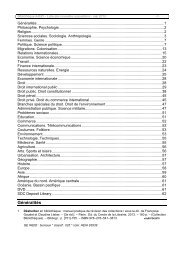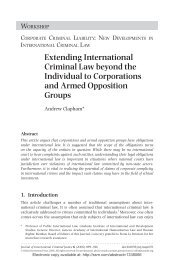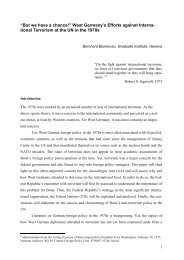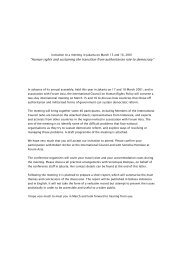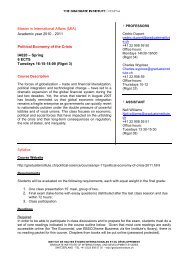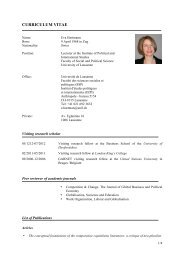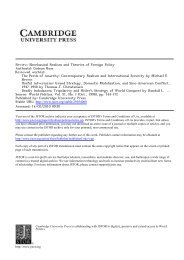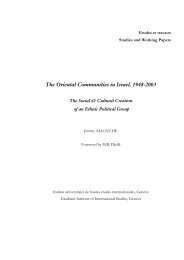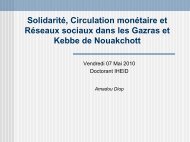Download [pdf] - The Graduate Institute, Geneva
Download [pdf] - The Graduate Institute, Geneva
Download [pdf] - The Graduate Institute, Geneva
You also want an ePaper? Increase the reach of your titles
YUMPU automatically turns print PDFs into web optimized ePapers that Google loves.
protective barriers will find themselves<br />
looking on as manufacturers take their<br />
custom elsewhere, thereby excluding<br />
them from global supply chains.<br />
Protectionism has become<br />
destructionism.<br />
<strong>The</strong> new trade needs new rules – disciplines<br />
that go far beyond the WTO’s.<br />
To date, virtually all of the necessary<br />
governance has emerged spontaneously<br />
in regional trade agreements or<br />
via unilateral “pro-business” policy<br />
reforms by developing nations. <strong>The</strong> real<br />
threat, therefore, is not failure of the<br />
WTO, but rather the erosion of its centricity<br />
in the world trade system.<br />
This suggests that the WTO’s future<br />
will take one of two forms. In the first,<br />
the WTO will remain relevant for 20th<br />
century trade and the basic rules of<br />
the road, but irrelevant for 21st century<br />
trade; all “next generation” issues will<br />
be addressed elsewhere.<br />
In the optimistic version of this scenario,<br />
which seems to be where the current<br />
trajectory is leading us, the WTO<br />
will remain one of several pillars of<br />
world trade governance. This sort of<br />
outcome is familiar from the EU’s threepillar<br />
structure, where the first pillar<br />
(basically the disciplines agreed in treaties<br />
up the 1992 Maastricht Treaty)<br />
was supplemented by two new pillars<br />
to cover new areas of cooperation. In<br />
the pessimistic version of this scenario,<br />
lack of progress will undermine political<br />
support and WTO discip lines will<br />
start to be widely flouted; the bicycle,<br />
so to speak, will fall over when forward<br />
motion halts.<br />
Under the second scenario, the WTO’s<br />
centricity is reinvigorated. In this scenario,<br />
the organisation engages in 21st<br />
century trade issues both by crafting<br />
new multilateral disciplines – or at least<br />
general guidelines – on matters such<br />
as investment assurances and by multilateralising<br />
some of the new discip lines<br />
that have arisen in regional trade<br />
agreements.<br />
<strong>The</strong>re are many variants of this future<br />
outlook. <strong>The</strong> engagement could take<br />
the form of plurilaterals where only a<br />
subset of WTO members sign up to the<br />
disciplines. Examples of this are found<br />
in the Information Technology<br />
Agreement and the Government<br />
Procurement Agreement. It could also<br />
take the form of an expansion of the<br />
Doha Round agenda to include some<br />
of the new issues that are now routinely<br />
considered in regional trade<br />
agreements.<br />
Of course, 20th century trade is still<br />
with us, and is important in some goods<br />
(e.g. primary goods) and for some<br />
“<strong>The</strong> real threat,<br />
[…] is not failure of<br />
the WTO, but rather<br />
the erosion of its<br />
centricity in the<br />
world trade system.”<br />
nations (international supply chains<br />
are still rare in Latin America and<br />
Africa), but the most dynamic aspect<br />
of trade today is the development of<br />
international value chains.<br />
Where the WTO’s future seems cloudy<br />
is on the 21st century trade front. <strong>The</strong><br />
demands for new rules and disciplines<br />
governing the nexus of trade, investment,<br />
services, intellectual property,<br />
and business mobility are being formulated<br />
outside the WTO. Developing<br />
nations are rushing to unilaterally lower<br />
their tariffs (especially on intermediate<br />
goods) and unilaterally reduce behindthe-border<br />
barriers to the trade-investment-services-IP<br />
nexus. Most nations<br />
are rushing to sign bilateral investment<br />
treaties, and “deep” regional trade<br />
agreements that provide the 21st century<br />
disciplines. All of this has markedly<br />
eroded the WTO centrality in the<br />
system of global trade governance.<br />
<strong>The</strong> implication of this is clear. <strong>The</strong><br />
WTO’s future will either be to stay on<br />
the 20th century side-track on to which<br />
it has been shunted, or to engage constructively<br />
and creatively in the new<br />
range of disciplines necessary to underpin<br />
21st century trade. •<br />
LA REVUE DE L’INSTITUT I THE GRADUATE INSTITUTE REVIEW I GLOBE I N11 Printemps I Spring 2013<br />
13


![Download [pdf] - The Graduate Institute, Geneva](https://img.yumpu.com/23370020/14/500x640/download-pdf-the-graduate-institute-geneva.jpg)
